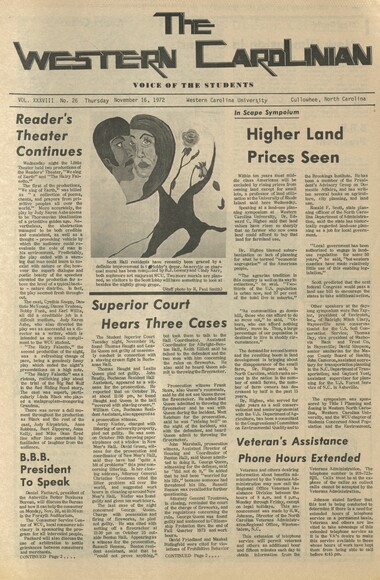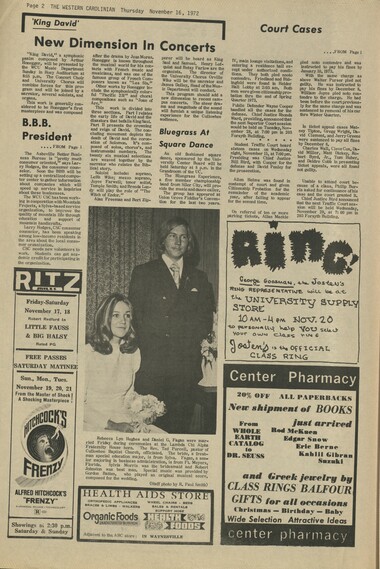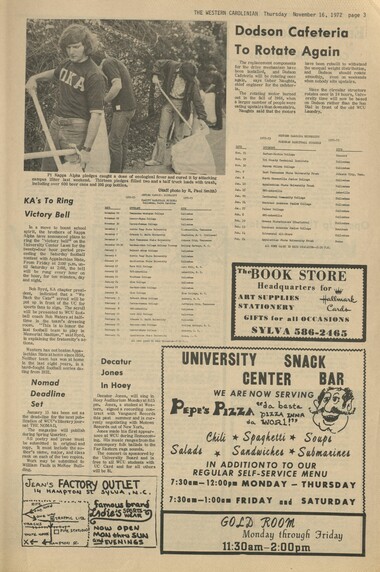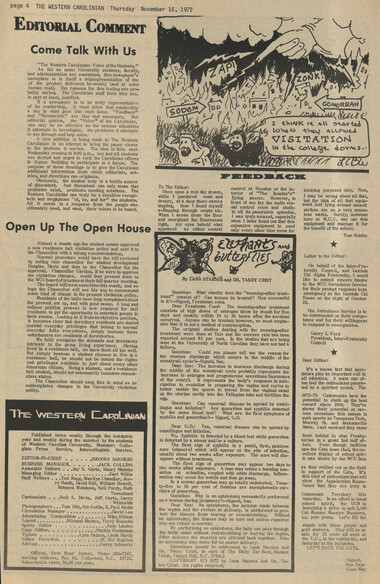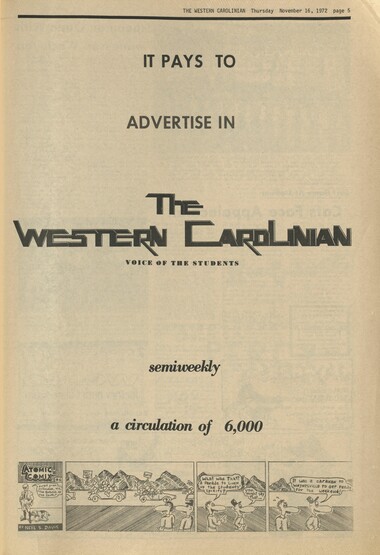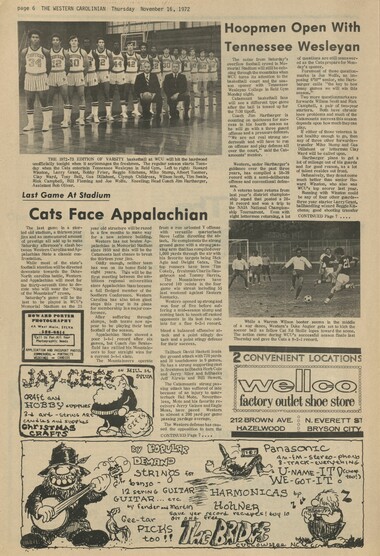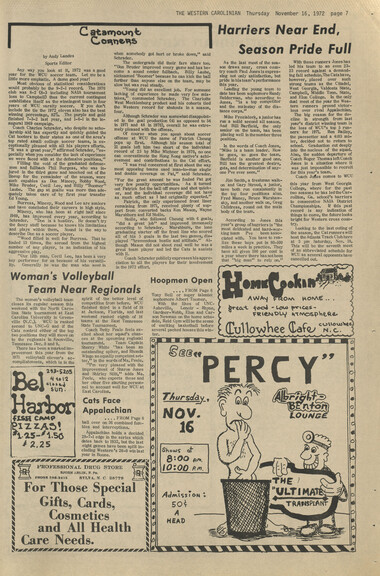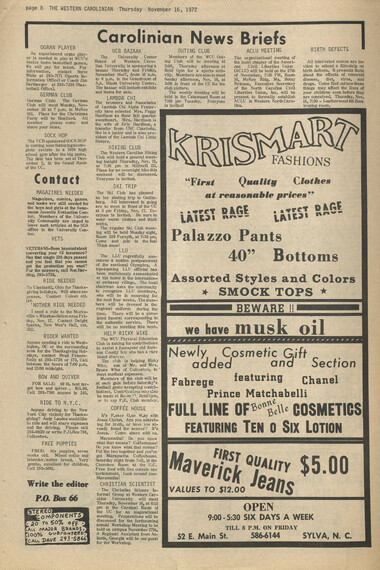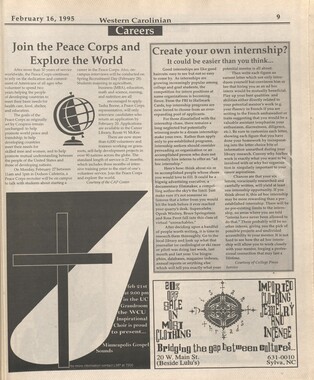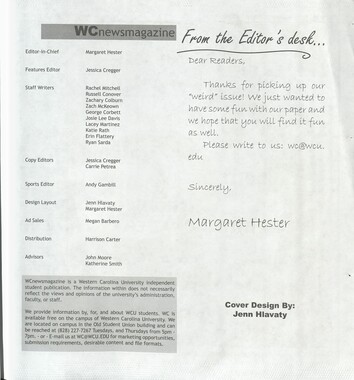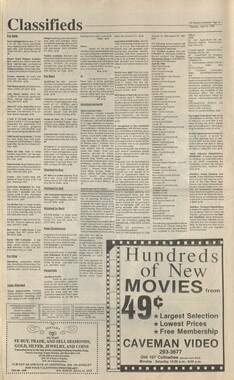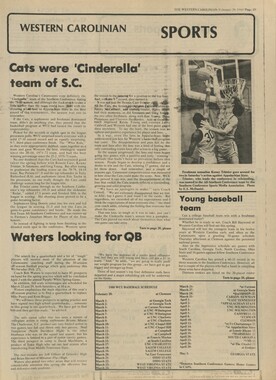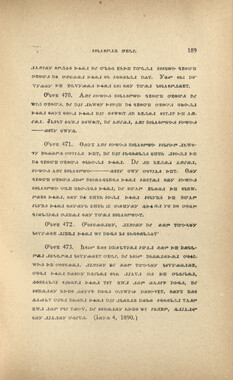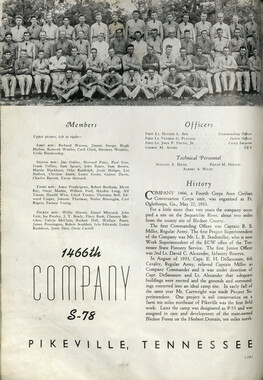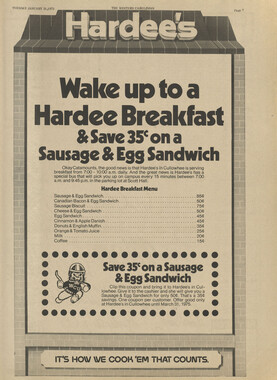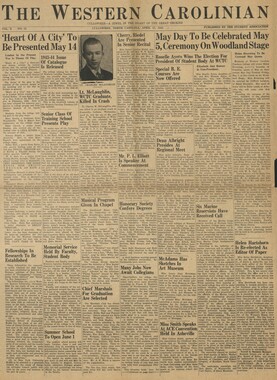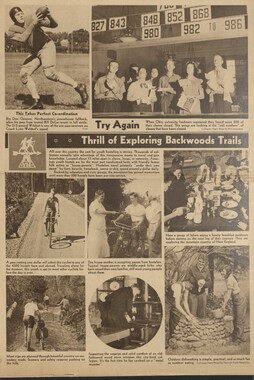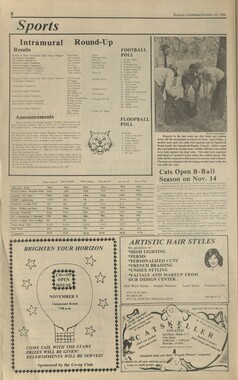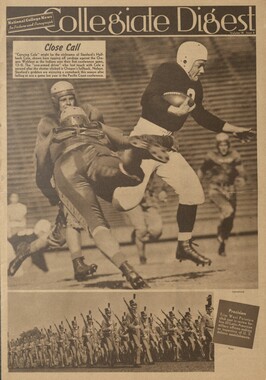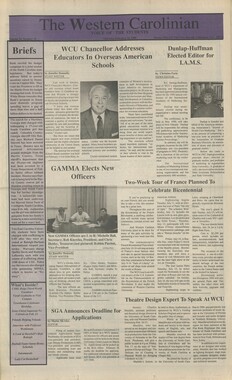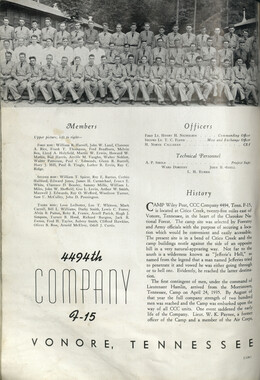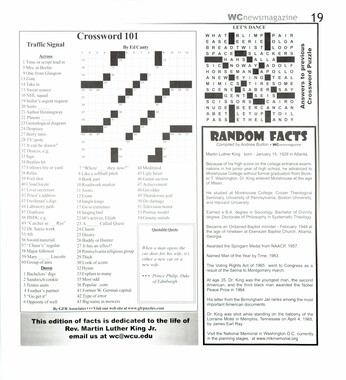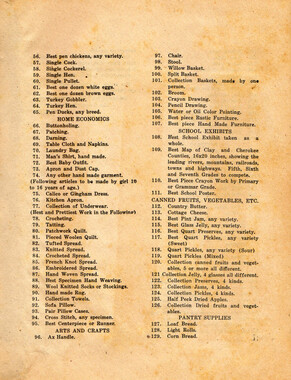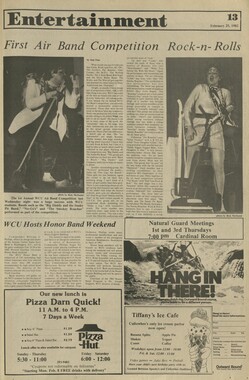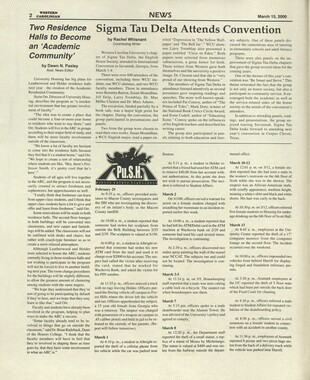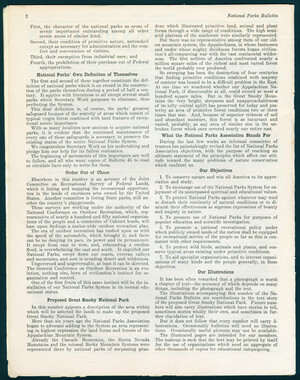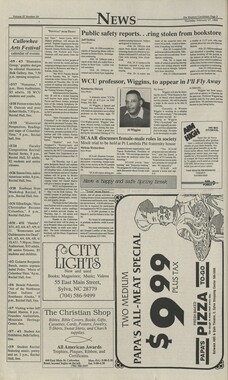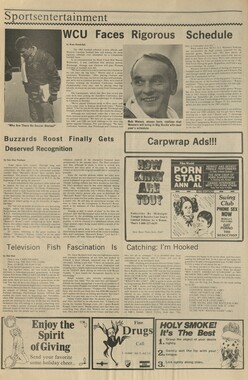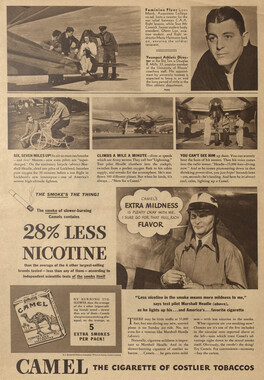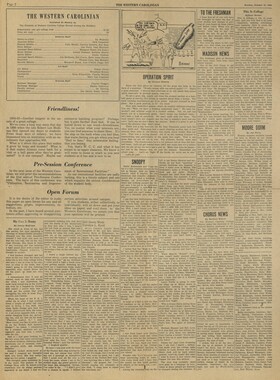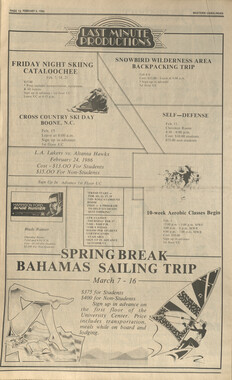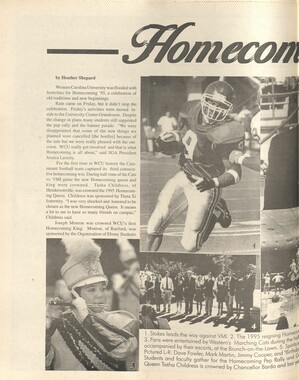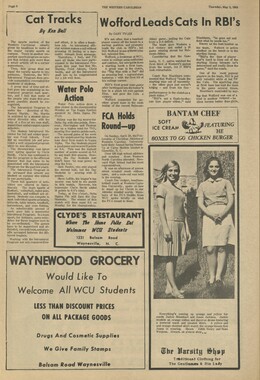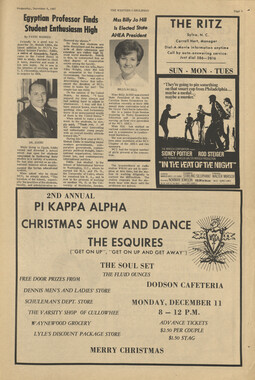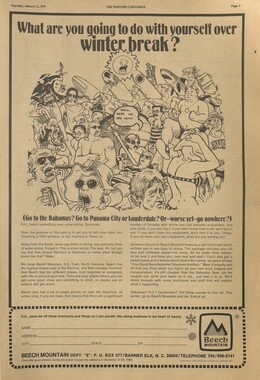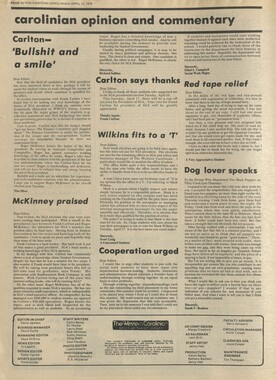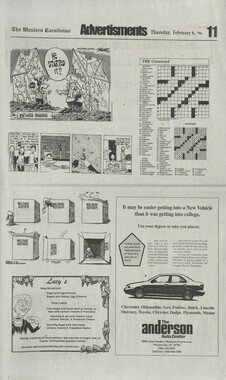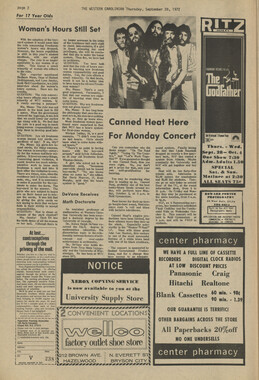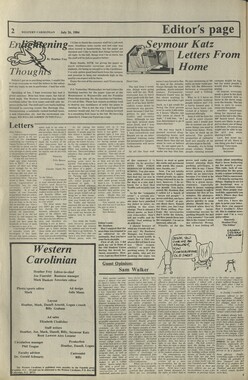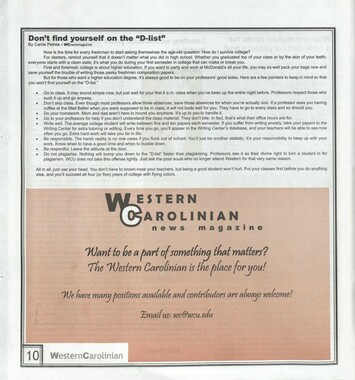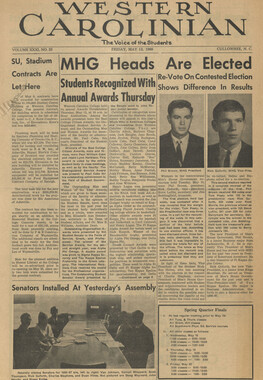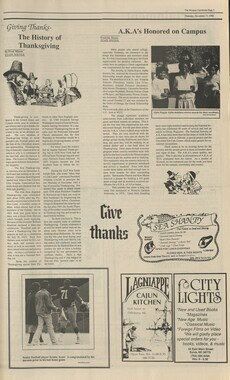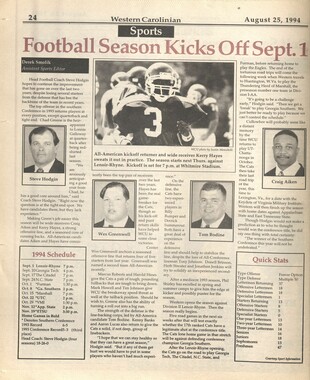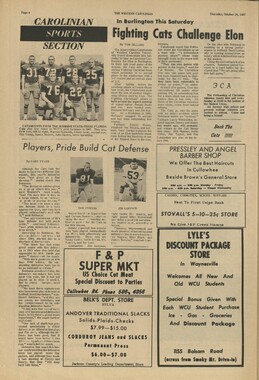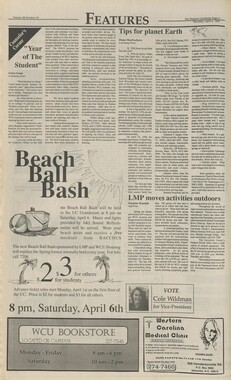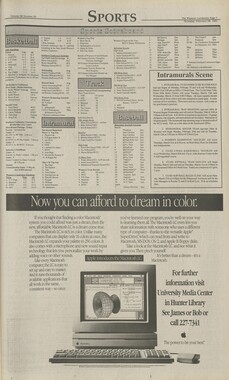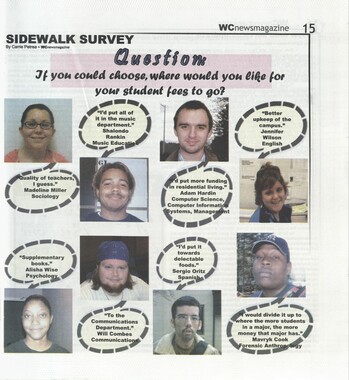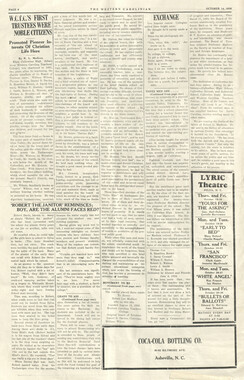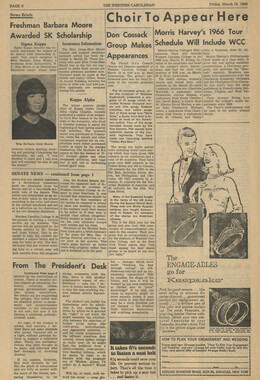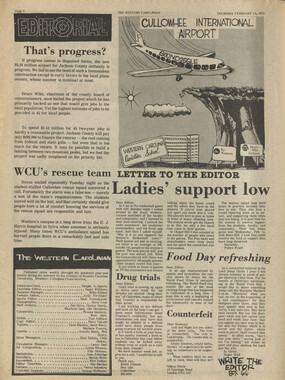Western Carolina University (20)
View all
- Canton Champion Fibre Company (2308)
- Cherokee Traditions (291)
- Civil War in Southern Appalachia (165)
- Craft Revival (1942)
- Great Smoky Mountains - A Park for America (2857)
- Highlights from Western Carolina University (430)
- Horace Kephart (941)
- Journeys Through Jackson (159)
- LGBTQIA+ Archive of Jackson County (85)
- Oral Histories of Western North Carolina (314)
- Picturing Appalachia (6772)
- Stories of Mountain Folk (413)
- Travel Western North Carolina (160)
- Western Carolina University Fine Art Museum Vitreograph Collection (129)
- Western Carolina University Herbarium (92)
- Western Carolina University: Making Memories (708)
- Western Carolina University Publications (2353)
- Western Carolina University Restricted Electronic Theses and Dissertations (146)
- Western North Carolina Regional Maps (71)
- World War II in Southern Appalachia (131)
University of North Carolina Asheville (6)
View all
- Allanstand Cottage Industries (62)
- Appalachian National Park Association (53)
- Bennett, Kelly, 1890-1974 (1388)
- Berry, Walter (76)
- Brasstown Carvers (40)
- Carver, George Washington, 1864?-1943 (26)
- Cathey, Joseph, 1803-1874 (1)
- Champion Fibre Company (233)
- Champion Paper and Fibre Company (297)
- Cherokee Indian Fair Association (16)
- Cherokee Language Program (22)
- Crowe, Amanda (40)
- Edmonston, Thomas Benton, 1842-1907 (7)
- Ensley, A. L. (Abraham Lincoln), 1865-1948 (275)
- Fromer, Irving Rhodes, 1913-1994 (70)
- George Butz (BFS 1907) (46)
- Goodrich, Frances Louisa (120)
- Grant, George Alexander, 1891-1964 (96)
- Heard, Marian Gladys (60)
- Kephart, Calvin, 1883-1969 (15)
- Kephart, Horace, 1862-1931 (313)
- Kephart, Laura, 1862-1954 (39)
- Laney, Gideon Thomas, 1889-1976 (439)
- Masa, George, 1881-1933 (61)
- McElhinney, William Julian, 1896-1953 (44)
- Niggli, Josephina, 1910-1983 (10)
- North Carolina Park Commission (105)
- Osborne, Kezia Stradley (9)
- Owens, Samuel Robert, 1918-1995 (11)
- Penland Weavers and Potters (36)
- Roberts, Vivienne (15)
- Roth, Albert, 1890-1974 (142)
- Schenck, Carl Alwin, 1868-1955 (1)
- Sherrill's Photography Studio (2565)
- Southern Highland Handicraft Guild (127)
- Southern Highlanders, Inc. (71)
- Stalcup, Jesse Bryson (46)
- Stearns, I. K. (213)
- Thompson, James Edward, 1880-1976 (226)
- United States. Indian Arts and Crafts Board (130)
- USFS (683)
- Vance, Zebulon Baird, 1830-1894 (1)
- Weaver, Zebulon, 1872-1948 (58)
- Western Carolina College (230)
- Western Carolina Teachers College (282)
- Western Carolina University (1840)
- Western Carolina University. Mountain Heritage Center (18)
- Whitman, Walt, 1819-1892 (10)
- Wilburn, Hiram Coleman, 1880-1967 (73)
- Williams, Isadora (3)
- Cain, Doreyl Ammons (0)
- Crittenden, Lorraine (0)
- Rhodes, Judy (0)
- Smith, Edward Clark (0)
- Appalachian Region, Southern (2569)
- Asheville (N.C.) (1923)
- Avery County (N.C.) (26)
- Blount County (Tenn.) (169)
- Buncombe County (N.C.) (1672)
- Cherokee County (N.C.) (283)
- Clay County (N.C.) (555)
- Graham County (N.C.) (233)
- Great Smoky Mountains National Park (N.C. and Tenn.) (519)
- Haywood County (N.C.) (3567)
- Henderson County (N.C.) (70)
- Jackson County (N.C.) (4745)
- Knox County (Tenn.) (31)
- Knoxville (Tenn.) (12)
- Lake Santeetlah (N.C.) (10)
- Macon County (N.C.) (420)
- Madison County (N.C.) (215)
- McDowell County (N.C.) (39)
- Mitchell County (N.C.) (132)
- Polk County (N.C.) (35)
- Qualla Boundary (981)
- Rutherford County (N.C.) (76)
- Swain County (N.C.) (2117)
- Transylvania County (N.C.) (270)
- Watauga County (N.C.) (12)
- Waynesville (N.C.) (84)
- Yancey County (N.C.) (72)
- Aerial Photographs (3)
- Aerial Views (60)
- Albums (books) (4)
- Articles (1)
- Artifacts (object Genre) (228)
- Bibliographies (1)
- Biography (general Genre) (2)
- Cards (information Artifacts) (38)
- Clippings (information Artifacts) (191)
- Copybooks (instructional Materials) (3)
- Crafts (art Genres) (622)
- Depictions (visual Works) (21)
- Design Drawings (1)
- Drawings (visual Works) (185)
- Envelopes (73)
- Exhibitions (events) (1)
- Facsimiles (reproductions) (1)
- Fiction (general Genre) (4)
- Financial Records (12)
- Fliers (printed Matter) (67)
- Glass Plate Negatives (381)
- Guidebooks (2)
- Internegatives (10)
- Interviews (815)
- Land Surveys (102)
- Letters (correspondence) (1013)
- Manuscripts (documents) (618)
- Maps (documents) (177)
- Memorandums (25)
- Minutes (administrative Records) (59)
- Negatives (photographs) (5926)
- Newsletters (1290)
- Newspapers (2)
- Notebooks (8)
- Occupation Currency (1)
- Paintings (visual Works) (1)
- Pen And Ink Drawings (1)
- Periodicals (193)
- Personal Narratives (10)
- Photographs (12976)
- Plans (maps) (1)
- Poetry (5)
- Portraits (4535)
- Postcards (329)
- Programs (documents) (151)
- Publications (documents) (2305)
- Questionnaires (65)
- Sayings (literary Genre) (1)
- Scrapbooks (282)
- Sheet Music (2)
- Slides (photographs) (402)
- Songs (musical Compositions) (2)
- Sound Recordings (796)
- Specimens (92)
- Speeches (documents) (15)
- Tintypes (photographs) (8)
- Transcripts (322)
- Video Recordings (physical Artifacts) (23)
- Vitreographs (129)
- Text Messages (0)
- A.L. Ensley Collection (275)
- Appalachian Industrial School Records (7)
- Appalachian National Park Association Records (336)
- Axley-Meroney Collection (2)
- Bayard Wootten Photograph Collection (20)
- Bethel Rural Community Organization Collection (7)
- Blumer Collection (5)
- C.W. Slagle Collection (20)
- Canton Area Historical Museum (2110)
- Carlos C. Campbell Collection (373)
- Cataloochee History Project (64)
- Cherokee Studies Collection (4)
- Daisy Dame Photograph Album (5)
- Daniel Boone VI Collection (1)
- Doris Ulmann Photograph Collection (112)
- Elizabeth H. Lasley Collection (1)
- Elizabeth Woolworth Szold Fleharty Collection (4)
- Frank Fry Collection (95)
- George Masa Collection (173)
- Gideon Laney Collection (452)
- Hazel Scarborough Collection (2)
- Hiram C. Wilburn Papers (28)
- Historic Photographs Collection (236)
- Horace Kephart Collection (861)
- Humbard Collection (33)
- Hunter and Weaver Families Collection (1)
- I. D. Blumenthal Collection (4)
- Isadora Williams Collection (4)
- Jesse Bryson Stalcup Collection (47)
- Jim Thompson Collection (224)
- John B. Battle Collection (7)
- John C. Campbell Folk School Records (80)
- John Parris Collection (6)
- Judaculla Rock project (2)
- Kelly Bennett Collection (1407)
- Love Family Papers (11)
- Major Wiley Parris Civil War Letters (3)
- Map Collection (12)
- McFee-Misemer Civil War Letters (34)
- Mountain Heritage Center Collection (4)
- Norburn - Robertson - Thomson Families Collection (44)
- Pauline Hood Collection (7)
- Pre-Guild Collection (2)
- Qualla Arts and Crafts Mutual Collection (12)
- R.A. Romanes Collection (681)
- Rosser H. Taylor Collection (1)
- Samuel Robert Owens Collection (94)
- Sara Madison Collection (144)
- Sherrill Studio Photo Collection (2558)
- Smoky Mountains Hiking Club Collection (616)
- Stories of Mountain Folk - Radio Programs (374)
- The Reporter, Western Carolina University (510)
- Venoy and Elizabeth Reed Collection (16)
- WCU Gender and Sexuality Oral History Project (32)
- WCU Mountain Heritage Center Oral Histories (25)
- WCU Oral History Collection - Mountain People, Mountain Lives (71)
- WCU Students Newspapers Collection (1784)
- Western North Carolina Tomorrow Black Oral History Project (69)
- William Williams Stringfield Collection (2)
- Zebulon Weaver Collection (109)
- African Americans (390)
- Appalachian Trail (35)
- Artisans (521)
- Cherokee art (84)
- Cherokee artists -- North Carolina (10)
- Cherokee language (21)
- Cherokee pottery (101)
- Cherokee women (208)
- Church buildings (170)
- Civilian Conservation Corps (U.S.) (110)
- College student newspapers and periodicals (1876)
- Dams (107)
- Dance (1023)
- Education (222)
- Floods (61)
- Folk music (1015)
- Forced removal, 1813-1903 (2)
- Forest conservation (220)
- Forests and forestry (1184)
- Gender nonconformity (4)
- Great Smoky Mountains National Park (N.C. and Tenn.) (181)
- Hunting (45)
- Landscape photography (25)
- Logging (118)
- Maps (83)
- Mines and mineral resources (8)
- North Carolina -- Maps (18)
- Paper industry (38)
- Postcards (255)
- Pottery (135)
- Railroad trains (71)
- Rural electrification -- North Carolina, Western (3)
- School integration -- Southern States (2)
- Segregation -- North Carolina, Western (5)
- Slavery (5)
- Sports (452)
- Storytelling (243)
- Waterfalls -- Great Smoky Mountains (N.C. and Tenn.) (66)
- Weaving -- Appalachian Region, Southern (280)
- Wood-carving -- Appalachian Region, Southern (328)
- World War, 1939-1945 (173)
Western Carolinian Volume 38 Number 26
Item
Item’s are ‘child’ level descriptions to ‘parent’ objects, (e.g. one page of a whole book).
-
-
V/ESTlEf$l CJu^pLAlAlI VOICE OF THE STUDENTS VOL. XXXVIII No. 26 Thursday November 16, 1972 Western Carolina University Cullowhee, North Carolina Reader's Theater Continues Wednesday night the Little Theater held two productions of the Readers' Theater, "We sing of Earth" and "The Hairy Falsetto." The first of the productions, "We sing of Earth," was billed as " a collection of poems, chants, and prayers from primitive peoples all over the world." More accurately, the play by Judy Karen Ashe seems to be Thoreauvian idealization of a primitive golden age. Nevertheless, the abstraction managed to be both credible and consistent, as well as a thought - provoking vehicle by which the audience could reevaluate the role of man in his environment. Predictably, the play ended with a warning that man could learn to coexist with nature or die; however the superb dialogue and poetic beauty of the speeches elevated the production far a- bove the level of atypicalback- to - nature diatribe. In fact, the play seemed fresh throughout. The cast, Cynthia Knopp, Dan» ttete McYoung, Dianne Trudeau, Bobby Funk, and Earl Willis, all did a creditable job in a dificult medium. Judy Karen Ashe, who also directed the play was as successful as a director as a writer, which is intended as no small compliment to the WCU student, "The Hairy Falsetto," the second production of the night, was a refreshing change of pace, being a genuinely funny play which ended the night's presentations on a high note. "The Hairy Falsetto" was a riotous, rollicking play about the trial of the Big Bad Wolf in the Red Riding Hood story. The cast was superb, particularly Linda Black who played a malapropism-mongering Grandma. There was never a dull moment throughout the production as Black and the rest of the cast, Jody Kirpatrick, Anne Robbins, Bert Zipperer, Anna Kelly, and Mike Dean fired line after line punctuated by fusillades of laughter from the audience. B.B.B. President To Speak Daniel Packard, president of the Asheville Better Business Bureau, will discuss the Bureau and how it can help the consumer on Monday, Nov. 20, atl0:30am in the Forsyth Auditorium. The Consumer Service Center of WCU, local consumer advisory is sponsoring the program for all interested people. Packard will also discuss the use of arbitration to settle grievances between consumers and merchants. CONTINUED Page 2 . . . . In Scape Sympoium Scott Hall residents have recently been graced by a definite improvement in t |»lobby's decor. An acrylic on charcoal mural has been completed by B.J, Loweryand Cindy Karr, both sophmore art majors at WCU, Two more murals are planned, so visitors to the Scott lobby will have something to look at besides the nightly group grope, (Staff photo by R. Paul Smith) Superior Court Hears Three Cases The Student Superior Court Tuesday night, November 14, found Thomas Haught and Leslie Queen not guilty of unseemly conduct in connection with a shaving cream fight in Buchanan Hall. Thomas Haught and Leslie Queen pled not guilty. John Beatly, Buchanan Resident Hall Assistant, appeared as a witness for the prosecution. He reported that on October 19, at about 11:50 pm, he found Haught and Queen in the hall "covered with shaving cream." William Cox, Buchanan Resident Assistant, also appeared as a prosecution witness, Jerry Kiefer, charged with littering of universityproperty, pled not guilty. He was seen on October 19th throwing paper airplanes out a window in New Men's Hall. David Gruen, witness for the prosecution and coordinator of New Men's Hall, said they have had "quite a bit of problems" this year concerning littering. In her closing address, Attorney General Christine Troutman cited the Utter problem all over the world, and suggested work hours in cleaning up around New Men's Hall. Kiefer was found guilty and given ten work hours. The last case of the night concerned George Queen. Charge with possession and firing of fireworks, he pled not guilty. He was cited with setting off a firecracker at 11:30 pm on October 25 outside Benton Hall. Appearingas a witness for the prosecution, Russell Henson, Benton resident assistant, said that he "could not prove anything," but took them to talk to the Hall Coordinator. Assistant Coordinator for Albright-Benton Hall, Keith Elliott said he talked to the defendant and the two men with him concerning the rules on fireworks. He also said he heard Queen admit to throwing the firecracker. Prosecution witness Frank Stora, also Queen's roommate, said he did not see Queen throw the firecracker. He added that Queen admitted to throwing the firecracker and he was with Queen during the incident. Matt Ketchum for the prosecution, said he was "raising hell" on the night of the incident, was with the defendent, and heard Queen admit to throwing the firecracker. John Marshall, prosecution witness, Assistant Director of Housing and Coordinator of Benton Hall, said Queen admitted to doing it. George Queen, witnessing for the defense, said he "did not do it." He added that he had been "worried for his life," because someone had threatened his life. Russell Henson was recalled for further questioning. Attorney General Troutman, in closing, reminded the court of the charge of fireworks, and the regulations concerning the rule. George Queen was found guilty and sentenced to Citizenship Probation thru the end of Fall Quarter 1973 and work hours. David Friedland and Maskel Bidingfeld were cited for violations of Prohibitive Behavior CONTINUED Page 2..., Higher Land Prices Seen Within ten years most middle class Americans will be excluded by rising prices from owning land except for small lots, a professor of land utilization at the University of Rhode Island said here Wednesday. Speaking at a land-use planning symposium at Western Carolina University, Dr. Edward C. Higbee said that land values have risen so sharply that no farmer who now owns land could afford to buy that land for farmland use. Dr. Higbee blamed suburbanization on lack of planning for what he termed "economic segregation" of the American people. "The agrarian tradition in this country is well on its way to extinction," he said. "Two- thirds of the U.S. population is urban now, and 37 per cent of the total live in suburbs." "As communities go downhill, those who can afford to do so move out," he said. "Others, who can afford nothing better, move in. Thus, a large percentage of our population is destined to live in shoddy circumstances." The demand for second homes and the resulting boom in land development is bringing about the disappearance of the small farm, Dr. Higbee said. In North Carolina, which ranks second in the nation in the number of small farms, the number of farm owners has decreased by half in the past 15 years. Dr. Higbee, who served for eight years as a soil conservationist and senior agronomist with the U.S. Department of Agriculture, has been a consultant to the Congressional Committee on Environmental Quality and to the Brookings Institute. He has been a member of the President's Advisory Group on Domestic Affairs, and has written several books on agriculture, city planning, and land use, Ronald F, Scott, state planning officer of the North Carolina Department of Administration, said the state has historically regarded land-use planning as a job for local government. "Local government has been authorized to engage in land- use regulation for some 50 years," he said, "butwestern counties have made relatively little use of this enabling legislation." Scott predicted that the next federal Congress would pass a land use bill to encourage the states to take additional action. Other speakers at the daylong symposium were Ben Taylor, president of Envirotek, Inc., of Raleigh; Mitch Clary, Waynesville area conservationist for the U.S. Soil Conservation Service; Thomas Day, vice president of Wachovia Bank and Trust Co. in Hayesville; Efavid Simpson, senior sanitarian for the Macon County Board of Health; John Cameron, assistant secretary for transportation planning in the N.C. Department of Transportation; and Gaylord Yost, assistant supervisor for planning for the U.S. Forest Service of N.C. in Asheville. The symposium was sponsored by Title I Planning and Zoning in Western North Carolina, Western Carolina University, and the WCU chapter of Students Concerned About Population and the Environment. Veteran's Assistance Phone Hours Extended Veterans and others desiring information about benefits administered by the Veterans Administration may now call the Regional Office Veterans Assistance Division between the hours of 8 a.m. and 6 p.m., Monday through Friday, except on legal holidays. This announcement was made by H.W, Johnson, Director of the North Carolina Veterans Administr- ationRegional Office, Winston- Salem, N.C. This extension of telephone service will permit veterans and others an additional hour and fifteen minutes each day to obtain information from the Veterans Administration. The telephone number is 919-723- 9211, Calls must be at the expense of the caller as collect calls cannot be accepted by the Veterans Administration. Johnson stated further that this test is being conducted to determine if there is a need for extended hours of telephone service on a permanent basis. Veterans and others are invited to take advantage of this extended telephone service as it is the VA's desire to make this service available to those whose hours of work have kept them from being able to call before 4:45 pm.
Object
Object’s are ‘parent’ level descriptions to ‘children’ items, (e.g. a book with pages).
-
The Western Carolinian is Western Carolina University's student-run newspaper. The paper was published as the Cullowhee Yodel from 1924 to 1931 before changing its name to The Western Carolinian in 1933.
-
